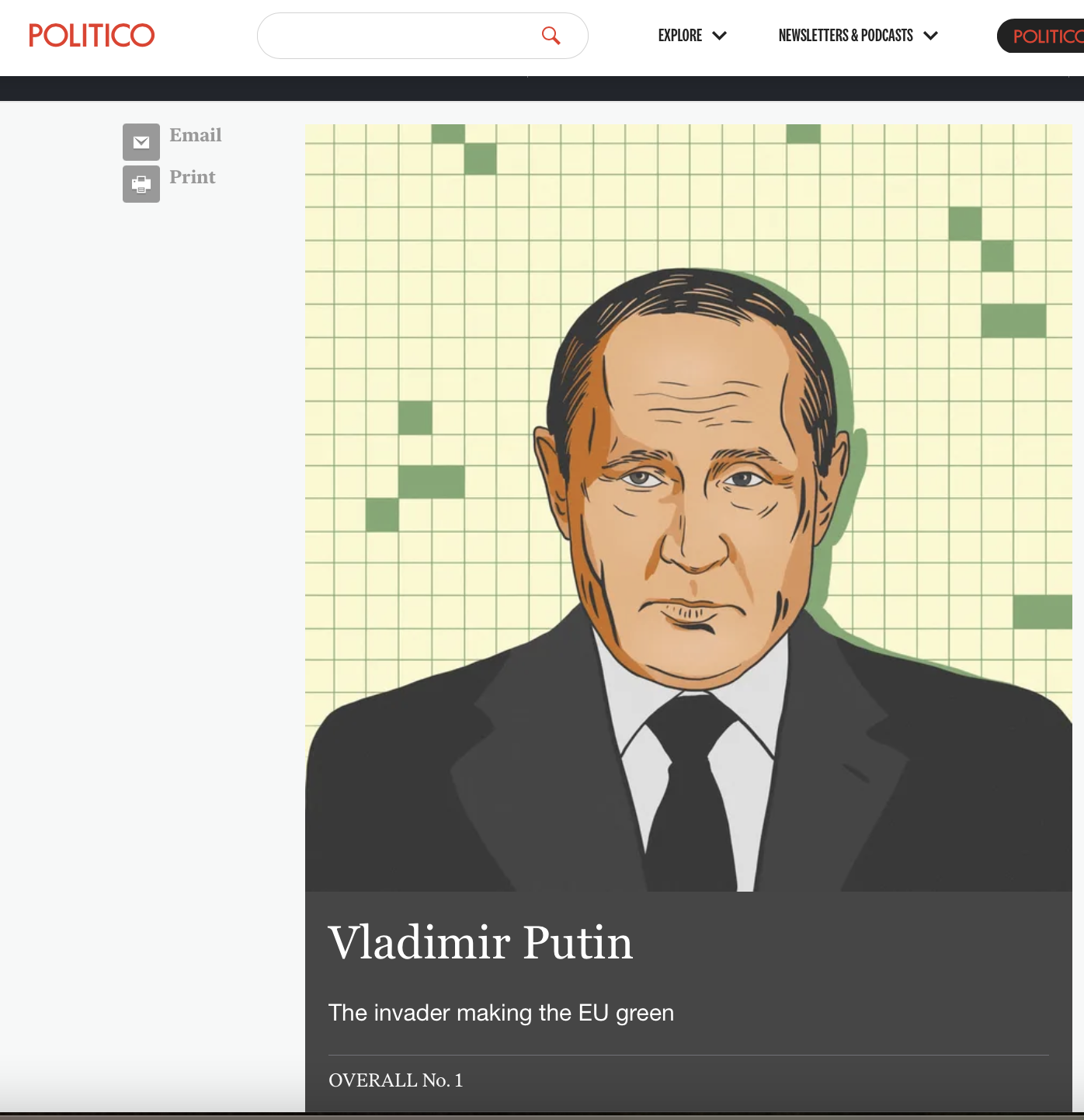You can't make a solar farm without breaking legs
/Politico hails Putin as second coming of Little Greta
It took a war criminal to speed up Europe’s green revolution.
By invading Ukraine and manipulating energy supplies to undermine European support for Kyiv, Russian President Vladimir Putin has achieved something generations of green campaigners could not — clean energy is now a fundamental matter of European security.
The political response from the EU was swift: Within weeks of the February 24 invasion, a plan was sketched out aimed at unhooking the Continent’s energy ties from Moscow. It leaned on three pillars: cutting oil, gas and coal supplies from Russia; getting gas and other fossil fuels from elsewhere; and massively speeding up the roll out of renewable power and energy saving measures.
“Renewables give us the freedom to choose an energy source that is clean, cheap, reliable, and ours,” EU Green Deal chief Frans Timmermans said less than two weeks after Putin’s tanks rolled in.
Seven months on, a POLITICO survey of data on clean energy, energy savings and policies shows that the first signs of that green surge are appearing. Analysts are in little doubt that the change is structural, permanent and historic.
“We will look back at this situation in 10 years time and see, OK, that was the moment where we really got serious about the green transition and we really had the big green acceleration,” said Simone Tagliapietra, a research fellow at the Brussels-based think tank Bruegel.
Putin’s miscalculations on the battlefield have been well documented. But he also mistimed his energy war. He attacked Europe’s energy system just as an array of cheap and reliable alternatives became realistic. That’s not only solar and wind, which now generate power at a fraction of the cost of gas; products that even five years ago had barely entered the market, such as heat pumps, are now mature.
Putin also invaded Ukraine after the EU had spent two years laying the foundations of its Green Deal program for zeroing out emissions by 2050. That meant the policy machinery for a total remake of the European energy economy was already moving. All it needed was a nudge.
The green acceleration doesn’t mean Europeans will avoid a succession of brutally cold and expensive winters. This crisis also means that governments across the bloc have been preoccupied with short-term measures to stave off blackouts, rather than doing their utmost to aid the longer-term energy shift.
But those immediate actions to keep the lights on are largely temporary and might avoid longer-term dirty investments. A reversion to coal power in several countries means a surge in emissions, but it’s also killed the idea that natural gas will serve as a “bridge” fuel to ease the path to net-zero emissions — something that had been an article of faith in EU thinking for much of the past decade.
“Gas will probably be around in some form at least until 2050, but the notion of it being a transition fuel … certainly has weakened pretty strongly over the last 12 months,” said Glenn Rickson, the head of European power analysis at S&P Global.
Despite the distractions hounding political leaders, [you know, distractions: threat of nuclear war; millions of refugees; a country destroyed; that sort of thing. Meh.] the war and the linked surge in energy prices are having a profound impact on households and businesses across the bloc; demand is surging for heat pumps, solar panels and insulation as salvation from scary bills.
Putin’s influence on Europe’s green agenda in 2022 is inarguable. Every decision on investment, research and policy is now being filtered through the lens of energy as a matter of European security.
This has broadened the political coalition for green energy. Politicians who considered the safety of the climate a softer imperative than the economy or military can now embrace a heat pump as if it were a howitzer. In the days after the invasion, German Finance Minister Christian Lindner — a free market liberal who is no great friend of the climate agenda — declared renewable energy to be “the energy of freedom.”
While Ukrainians are the primary victims of the war, Europeans have been hit hard by Putin’s weaponization of energy. But the consequences mean an EU that becomes greener, faster, than before Russian troops marched across the Ukrainian border. That impact will be more than a footnote in the history of the war.
Not worth even a footnote in the glorious battle for mother Gaia
And Related:
An article appearing on the United Nations Chronicle website as recently as Wednesday that touted the “benefits of world hunger” has seemingly been taken down.
Screenshots of the post, which web archives appear to show was first published in 2009, began to circulate on Twitter Wednesday.
A link to the article, which now takes visitors to an error page.
It was archived before it was apparently scrubbed from the website by the agency on Thursday.
In it, former University of Hawaii professor George Kent wrote,
We sometimes talk about hunger in the world as if it were a scourge that all of us want to see abolished, viewing it as comparable with the plague or aids. But that naïve view prevents us from coming to grips with what causes and sustains hunger. Hunger has great positive value to many people.
Indeed, it is fundamental to the working of the world’s economy. Hungry people are the most productive people, especially where there is a need for manual labour.
Kent went on to ask, “How many of us would sell our services so cheaply if it were not for the threat of hunger?” he further noted, “For those who depend on the availability of cheap labour, hunger is the foundation of their wealth.”
—Mediaite, July 22nd.


